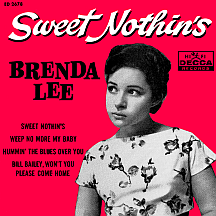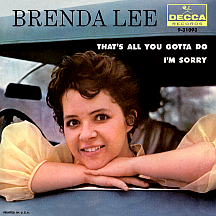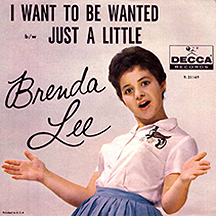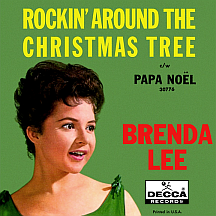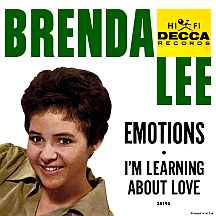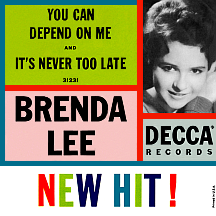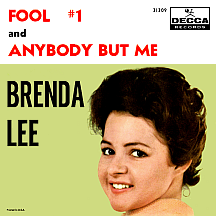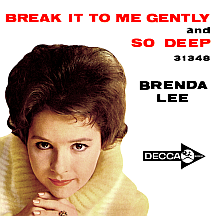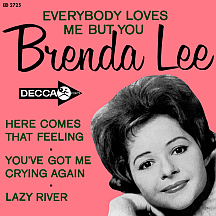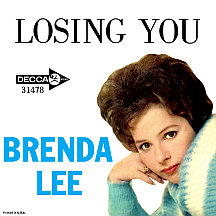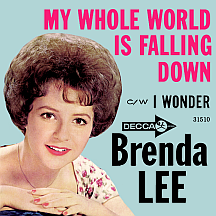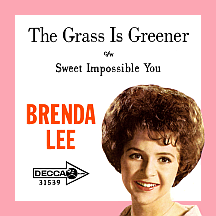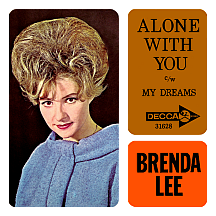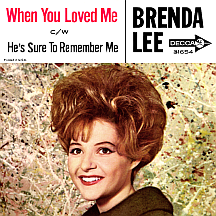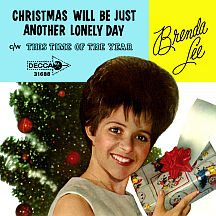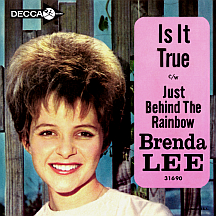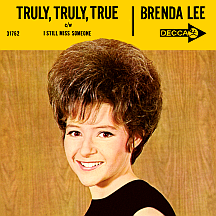BRENDA LEE
When Brenda Mae Tarpley made her first recordings in 1956, Decca Records promoted her as Little Brenda Lee (9 Years Old), disregarding the fact that she was actually eleven. Her unofficial singing debut had begun about five years earlier on an Atlanta radio station and perhaps the record company felt she might go over better if people thought her age was still in single digits. Good thing they gave her plenty of time to develop her style, since it wasn't until just after her 15th birthday that she finally made a major impact with a song more suited to someone a bit older ('My baby whispers in my ear...mmm, sweet nothin's...'). Her age was out of sync with the material, but it really didn't matter; people everywhere had been charmed by Brenda Lee.
Her earliest years were spent in Conyers, Georgia, some 20 miles east of Atlanta, where she became obsessed with her family's portable radio as early as age three, singing along with hit songs and memorizing many after just a few listens. In 1950, at age five, Brenda represented Conyers Elementary in a "Spring Festival" competition against nearby schools, taking first place with a polished rendition of "Take Me Out to the Ball Game." Soon she was being featured regularly on Starmakers Review, broadcast Saturdays on an Atlanta radio station; she received no pay and didn't mind, happy just to be singing for people. After a concerted effort by her mother, Grace Tarpley, and uncle, Cecil Yarbrough, Brenda began appearing on TV Ranch, a music series broadcast on WAGA-TV, channel five in Atlanta, hosted by local personality John Farmer and featuring The TV Wranglers, a western band previously known as the Radio Wranglers who, with leader Boots Woodall, had made records for the King and Bullet labels and, more recently, Mercury. For the next couple of years, Brenda Mae Tarpley (as she was still known) was a regular fixture on Atlanta television.
In May 1953, Brenda's father, contruction worker Ruben Tarpley, died after a serious on-the-job accident. Her mother remarried and the family moved to Augusta (further east near the border of South Carolina), where her Atlanta reputation preceded her; more television work followed and at some point it was suggested she simplify her name to Brenda Lee. Her stepdad opened the Brenda Lee Record Shop and before long she was doing broadcasts from the store on WDRW radio. C&W superstar Red Foley, during a tour stop in Augusta in 1955, met the youngster (again thanks to her mother's and uncle's aggressiveness) and did the nearly-unthinkable: he put her onstage. She belted out the Hank Williams hit "Jambalaya" and the crowd in attendance clamored for more! Foley's manager, Dub Albritten, took particular notice. In March of 1956, she and her mom headed to Springfield, Missouri, where Foley originated his nationally-broadcast ABC-TV series Ozark Jubilee (he featured her on a segment called Junior Jubilee). The die was cast: Albritten became her manager and Foley's label, Decca, signed her to a contract under the supervision of Paul Cohen, Decca's head of artists and repertoire in Nashville.
Brenda's experience in front of live audiences was fairly extensive by the time she started making records at age eleven; audiences couldn't get enough of the pint-sized pixie with the big, booming voice. Decca, confident in her ability to be an all-around performer, nevertheless found marketing her to record buyers a daunting challenge. The song that had impressed Foley and everyone else at the Jubilee became her first single; "Jambalaya (On the Bayou)" was backed by the rocking Don Woody-Paul Simmons song "Bigelow 6-200." Produced by Cohen with arranger Owen Bradley, the tracks were recorded in July '56 and released at the end of summer. A pair of seasonal tunes, "I'm Gonna Lasso Santa Claus" and "Christy Christmas," followed; both singles carried the "9 Years Old" tagline but failed to connect despite high production values and rousing performances by the junior song-shouter.
"One Step at a Time," written by singer-songwriter Hugh Ashley (who'd penned some of Foley's material), made a top 50 chart showing in the spring of 1957 and Decca felt she was finally on her way. Albritten was less concerned than the Decca bigwigs about this slow, gradual development; his plan had never been to make some quick cash on a child novelty act (as others had done through the years) but rather, based on her exceptional vocal ability and enthusiasm, to build a lasting career for her. "Dynamite," a high-spirited, hand-clapping number penned by Mort Garson and folk stalwart Tom Glazer, featured prolific pop session group The Anita Kerr Singers in contrast to Brenda's countrified approach to her art. The song had a minor chart run in the summer while providing a nickname, "Little Miss Dynamite," that has stayed with Brenda throughout the decades. Several high-profile appearances on the Sunday evening Steve Allen Show led to guest shots on other network variety programs, all generating enthusiastic reaction, and an acting role on Navy Log, ABC's wartime anthology series, in an October '57 episode titled The Commander and the Kid. Somewhat surprisingly, all this small screen exposure failed to carry over to her record sales, a pattern that wasn't going to change anytime soon.
The lack of hit records didn't phase Brenda, or affect Dub's game plan. In December, at the ripe age of 13, she debuted on Nashville's Grand Ole Opry. She made frequent concert appearances with a vocal backing group, The Casuals, made up of some of her slightly-older schoolmates. The song that is arguably (but widely) considered her biggest hit wasn't successful on initial release. Johnny Marks had already made his mark with one of the most popular of all Christmas songs, "Rudolph the Red-Nosed Reindeer," a number one seller in '49 for Gene Autry, and would, several years down the line, add to his holiday track record with the Burl Ives standard "A Holly Jolly Christmas." He supplied Miss Lee with a tune that seemingly couldn't miss: "Rockin' Around the Christmas Tree," a late '58 effort that, inexplicably, bombed the first time out.
In 1959, Albritten decided to send the 14-year-old Lee overseas, partly as a test to see how European audiences would react to her. Still lacking a major hit, she started the tour in France, where large crowds curious to see the "32-year-old midget" (a bizarre promotional ploy, it was reported by a newspaper writer following a half-joking suggestion by Albritten), led to an extended engagement. European publications came up with their own variation on her nickname: "The Explosive Girl!" After returning to the States, she recorded "Bop-A-Lena" rocker Ronnie Self's "Sweet Nothin's," which began with the sound of her 'baby' whispering in her ear (mama's reaction: she '...turned on the front porch light, sayin'...come in daughter, that's enough for tonight!')...pretty sexy stuff for a ninth grader! The single got off to a slow start near the end of 1959, but the infectious tune gradually caught on and reached the top ten in March '60.
Bradley had been producing her sessions since '57, relying heavily on a trio of Nashville's best guitarists (Hank Garland, Grady Martin and Harold Bradley) who were key in what people in the industry began calling "The Nashville Sound," a pop-leaning variation on country that later evolved with the addition of (gasp!) string sections. The most notable example of the variant style came with the next single, also penned by Self, the deftly-arranged, string-accented ballad "I'm Sorry," highlighted by Brenda's emotional '...I was too blind to see' spoken passage. Fans wiped away their tears and bought the record, making it a number one hit in July and August. Its flip side, Jerry Reed's energetic "That's All You Gotta Do," had a concurrent run in the top ten. Early the following year, "I'm Sorry" nabbed Brenda a Grammy nomination for Best Vocal Performance, Female (though she lost to NARAS favorite Ella Fitzgerald).
Having Brenda record material that was mature beyond her years turned out to be the right choice. Now on a hot streak, she tackled an Italian song, "Per Tutta La Vita," written by Giuseppe "Pino" Spotti and Alberto Testa. "I Want to Be Wanted" (with English lyrics by Kim Gannon) returned her to the number one spot just three months after her first chart-topper. The success of these ballads emboldened Bradley and the following year he branched out, using the same string-and-guitar pop approach to Patsy Cline's studio recordings (revitalizing a career that had been in limbo since "Walkin' After Midnight" four years earlier). With Brenda firmly established as one of the hottest "new" acts in music, Decca rereleased "Rockin' Around the Christmas Tree" and this time it didn't go unnoticed, selling solidly in '60 and nearly every year since, becoming one of the most popular seasonal records of all time while receiving the most exposure of any of her recordings through repeated late-year airplay.
"Emotions" (a Mel Tillis-Ramsey Kearney ballad) got 1961 off to a strong start, while in England, where she had similarly broken through the previous year, a reissue of her more rocking 1959 single "Let's Jump the Broomstick" (its title referring to a marriage ritual in some cultures) was a surprise hit. "You Can Depend on Me," a song composed by Charles Carpenter, Louis Dunlap and jazz great Earl "Fatha" Hines, had been a hit for Louis Armstrong in 1932; it was Brenda's sixth to go top ten. A tenuous return to acting came with an appearance on a May '61 episode of the CBS comedy series The Danny Thomas Show, notable for her performance of an alternate version of "Dynamite." Later in the year she had a small part in the theatrical film The Two Little Bears starring Eddie Albert and Jane Wyman. Through it all she continued scoring top ten hits: the spunky "Dum Dum" (the first of several by relative newcomers Sharon Sheeley and Jackie DeShannon) and one-and-done writer Kathryn R. Fulton's "Fool #1." The B sides of these 45s (and all others through '63) also received a solid share of radio station exposure.
The hits came nonstop in '62 with "Break it to Me Gently," penned by Diane Lampert and actor-songwriter Joe Seneca, and Ronnie Self's "Everybody Loves Me But You" winding up as her ninth and tenth to reach the top ten. Sheeley and DeShannon contributed "Heart in Hand," another strong seller that peaked shy of the top ten. "All Alone Am I," a Manos Hadjidakis-Arthur Altman composition from the 1959 Greek film To Nisi Ton Gennaion (The Island of Brave Men), made up for any slight perception she might be slipping; it was her biggest hit in two years.
In 1963, Brenda graduated from high school and became a bride, though not in that order. Just 18, she and Ronnie Shacklett (he was also 18) tied the knot in April. There was no fanfare surrounding the marriage; news outlets weren't informed until later (after the couple had "jumped the broomstick," you might say). "Losing You," a song by French composer Jean Renard and U.S. songwriter Carl Sigman, put her in the top ten that spring. Shortly after graduation in June, she renewed her deal with Decca and signed a separate, three year contract with Universal Pictures, though the latter was a bit of a no-prize as she never made any movies for the studio. In April of '64 she found herself busy with a new priority as she gave birth to her first of two daughters (intriguingly named Julie and Jolie).
The impressive string of top ten hits ended just as her marriage began, but Brenda's hit streak was far from over. Songs like "My Whole World is Falling Down" (Jerry Crutchfield and country star Bill Anderson wrote that one with a little inspiration from the nursery rhyme "London Bridge is Falling Down"), "I Wonder" (a remake of Cecil Gant's 1945 "Harlem Hit Parade" chart-topper), Barry Mann and Mike Anthony's "The Grass is Greener" and Alex Zanetis's "As Usual" assured her presence in the top 40 into 1964. Later that year she toured England and made some recordings there (the first time in seven years that Owen Bradley wasn't involved), a smart move in view of the influx of British acts, led by The Beatles, that were jamming the American charts at the time. "Is it True," written by John Carter of U.K. band The Ivy League and produced by Mickie Most (with session player and future Yardbirds/Led Zeppelin star Jimmy Page on lead guitar), was a hit on both sides of the Atlantic in the fall. The successful experience prompted Bradley to consider more British material, resulting in Brenda's next single, a cover of Dave Berry's summer '64 U.K. top ten single "The Crying Game."
Highlights of her mid-'60s recordings include Harlan Howard's "Too Many Rivers" and the Richard Ahlert-Eddie Snyder song "Rusty Bells," both in 1965, and "Coming on Strong," a songwriting breakthrough for future country hitmaker Little David Wilkins. In late '66, Lynn Anderson had her first country hit with "Ride, Ride, Ride," a song her mother, singer Liz Anderson, had written; Brenda's cover version made the pop top 40 in early '67. A year later she similarly covered Willie Nelson's country hit "Johnny One Time" (penned by A.L. Owens and Dallas Frazier) and this performance landed her the second of her four Grammy nominations (the obviously-unrelated Peggy Lee winning the award this time around).
Brenda Lee transitioned nicely from pop into country music with Kris Kristofferson's "Nobody Wins" in the spring of 1973, kick-starting six consecutive top ten country hits through '75. The extensive series of pop smashes that had made her the only serious rival to Connie Francis, the most popular female singer of the era, had in most cases leaned, if only slightly, in a country direction, a natural outcome of making records in Nashville, Tennessee with seasoned local musicians. In the 1980s she was frequently backed by The Oak Ridge Boys (who scored a few country/pop crossover hits of their own). Six decades into her career, "Little Miss Dynamite" is still active...and the nickname still suits her.
NOTABLE SINGLES:
- Jambalaya (On the Bayou) - 1956
as Little Brenda Lee (9 Years Old) / - Bigelow 6-200 - 1956
as Little Brenda Lee (9 Years Old) - I'm Gonna Lasso Santa Claus - 1956
as Little Brenda Lee (9 Years Old) / - Christy Christmas - 1956
as Little Brenda Lee (9 Years Old) - One Step at a Time - 1957
- Dynamite - 1957
with the Anita Kerr Singers - Ain't That Love - 1957
with the Anita Kerr Singers - Rockin' Around the Christmas Tree /
Papa Nöel - 1958 - Let's Jump the Broomstick - 1959
- Sweet Nothin's - 1959
- I'm Sorry /
That's All You Gotta Do - 1960 - I Want to Be Wanted /
Just a Little - 1960 - Emotions /
I'm Learning About Love - 1961 - You Can Depend on Me /
It's Never Too Late - 1961 - Dum Dum /
Eventually - 1961 - Fool #1 /
Anybody But Me - 1961 - Break it to Me Gently /
So Deep - 1962 - Everybody Loves Me But You /
Here Comes That Feelin' - 1962 - It Started All Over Again /
Heart in Hand - 1962 - Save All Your Lovin' For Me /
All Alone Am I - 1962 - Your Used to Be /
She'll Never Know - 1963 - Losing You /
He's So Heavenly - 1963 - My Whole World is Falling Down /
I Wonder - 1963 - The Grass is Greener /
Sweet Impossible You - 1963 - As Usual - 1964
- Think /
The Waiting Game - 1964 - Alone With You - 1964
- When You Loved Me - 1964
- Is it True - 1964
- The Crying Game /
Thanks a Lot - 1965 - Truly, Truly, True - 1965
- Too Many Rivers - 1965
- Rusty Bells - 1965
- Ain't Gonna Cry No More - 1966
- Coming on Strong - 1966
- Ride, Ride, Ride - 1967
- Johnny One Time - 1969
- Nobody Wins - 1973


